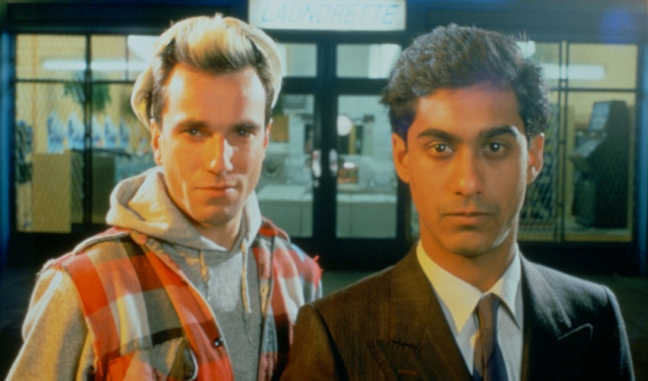
Disc Reviews
My Beautiful Laundrette (1985) Blu-ray Review

My Beautiful Laundrette (1985) is one of the key films of the 1980s. It is also one of the key films giving a dramatic understanding of Thatcher’s Britain. It was one of the first films to focus on the Asian and Pakistani experience of living in Britain. Added to the mix, there is also a mixed race homosexual relationship. The film proved a popular success on its release. It can’t have been an easy sell given the above premise. Never the less a film that was originally made as a TV movie before getting a theatrical release seemed to have resonated with audiences and, as Sarfraz Mazoor states in one of the essays accompanying this BFI relesae, there may not have been the likes of East is East (1999) or Bhaji on the Beach (1993) without My Beautiful Laundrette as it paved the way. It cannot be underestimated how divisive Thatcher’s brand of Tory was on the social fabric of Great Britain. As well as get rich Yuppies there were social tensions between minority communities and the police (who were later to have been found to have been institutionally racist), the term “Paki” or “Paki shop” was common place and homosexuality was still not widely accepted, let alone mixed relationships.
Little wonder then that a film would come along that would challenge this and yes, even change the face of British cinema. BFI’s release is the latest film to celebrate the 50th anniversary this year of the legalisation of homosexuality. But the gay relationship is presented as matter of fact in the film and is not the main focus. The central character is Omar Ali (Gordon Wanecke), the son of a Pakistani immigrant who lives in Battersea with his intelligent, but wasted and lame father (Roshan Seth). He is looking after his father full time since his mother died the previous year. Omar is offered a job by his Uncle Nasser (Saeed Jaffrey) to work initially cleaning cars in his lock up before offering him work at his rundown laundrette in Lambeth, as well as hopefully make a man of him. Nasser, in his own words is “a professional businessman, not a professional Pakistani”. Unlike other members of his family he does not dream of an ideal in Pakistan, a country he says has “been sodomised by religion” and embraces this “bloody” country as a place where you can get anything you want. Nasser, although married to a traditional Pakistani woman, is in an affair with a British cougar, Rachel (Shirley Ann Field). Omar demands that he run the laundrette and promises to turn it around. He runs into an old school friend, Johnny (Daniel Day Lewis), who drifted into hanging out with National Front characters and asks Johnny to join him on his venture, which he duly does. A short while later the pair begin a homosexual relationship.

The integration of the Pakistani characters is the most interesting aspect of this film. They seemed to have adapted well to the Thatcherite vision of Britain of entrepeneurs. Nowhere is this better played out than with the ruthless character of Salim (Derrick Branche), Nasser’s drug dealing son, brash and tacky as writer Hanif Kureshi seems to be mocking this kind of Asian vulgarity. Meanwhile, on the other side of the fence the white English characters seem to be feeling left behind, “swamped by immigrants” as the hateful right-wingers might term it. Kureshi and the film for all sorts of reasons faced criticism – for Kureshi’s portrayal of cliched Asians, for the depiction of homosexuality from both the Muslim/Pakistani community and the conservative right alike, as well as its negative portrayal of elements of ethnic minorities. Hitting a nerve is never a bad thing and that is exactly what Messrs. Kureshi and director Stephen Frears have done here. Kureshi would also go on to return to many of the similar films in this film in the successful TV series ‘Buddha of Suburbia’ (1993).
The film itself does look a little grainy but considering the film was originally intended to be made for Channel 4 television from the still relatively new channel it is nicely shot. The disc is graced with many extras including a vintage (audio only) Q&A following a screening with Frears, Kureshi and producers Sarah Radclyffe and Tim Bevan. At 98 minutes one to listen to on the move or washing up. Otherwise there is also a post screening Q&A with Warneke from 2015. Elsewhere there is a 1989 documentary by Bend it Like Beckham (2002) director Gurinder Chadha on what it’s like to be Asian in 1980s Britain and a short film by Prathiba Parma, starring Nisha Nayar and Meera Syal. Another bonus on the disc is a personal history on the history of British film by Frears in which he discusses with the likes of Alan Parker, Michael Apted, Alexander Mackendrick and critic Gavin Lambert on the identity of being British according to British cinema. There is also the accompanying essays in the booklet.
It would also be fair to say that My Beautiful Laundrette is also famous for being an early role for Daniel Day Lewis. Drawing on his own experiences growing up in working-class London this is an early notable film for Day-Lewis, although his performance is not really as outstanding as other roles he would later undertake. It also has to be added that London itself is also one of the stars of the film.
Chris Hick



